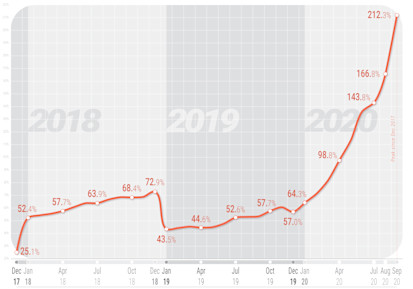
Soaring inflation hits the most vulnerable and increase humanitarian needs in Sudan
A surging inflation, with annual rates reaching 212 per cent in September, is leading to increased humanitarian needs in Sudan and hampering humanitarian assistance when the millions of vulnerable people across Sudan need it the most. UN agencies and humanitarian partners are finding it difficult to procure supplies, inputs and other items as the prices increase on a weekly basis. Shortage and high prices of fuel also affects the delivery of aid.
Most of humanitarian partners operating in Sudan procure the supplies and other inputs they require locally to contribute to the local economy and speed up the process. However, the increasing inflation and surge in the price of the hard currency in the parallel market resulted in vendors and suppliers increasing prices up to three or four-fold over the past few weeks.
“Many companies that we work with have either increased their prices exponentially or they are refusing to supply their products until the volatility in the parallel market stabilizes. This of course affects our operations and the people that we are providing assistance to,” explained Arshad Malik, Country Director of the NGO Save the Children International.
According to humanitarian organizations in Sudan, in some cases, by the time the procurement process is finalized, the suppliers might have increased prices to such an extent that the original budgets are no longer valid. This means that agencies have to restart the process from scratch, while there is no guarantee that by the time the process is done, the prices will not have risen once again.
“We operate with the official exchange rate of SDG 55 per US$ 1, and in the beginning of the year we budgeted our activities accordingly. However, with the parallel market rate shooting up to more than SDG 250, the vendors increased their prices more than double than what they were in June-July. This means that with the amount that we exchange at the official rate we now can only assist one out of four people assisted previously,” Malik said.
Water, sanitation and hygiene (WASH) projects, critical to respond to the ongoing floods and COVID-19 outbreak in Sudan has also been impacted. According humanitarians in the country, vendors providing services for water pumps, for example, are now charging three to four times more for the same item or work. Several organizations reported that lack of funding is preventing them from revising budgets, as increases of 300 or 400 per cent are not possible. As a consequence, water pumps are not repaired, water yards are not completed, and thousands of people are not able to get access to safe water.
According to organizations working with cash-transfer programmes, the spiraling inflation is also badly affecting people who receive this kind of assistance. Although organizations increased the monthly amount disbursed, the adjustments are not enough to maintain the purchasing power of the families. “International organizations base the assistance in dollars and we have to use the official rate for the transfers. If a beneficiary was getting about $200 in the beginning of the year, once we transferred it in Sudanese pounds, the money would cover their main needs. However, now the same amount converted into SDG at the official rate, can only suffice for 20 to 25 per cent of what they could buy before,” explained Malik.
Activities in the health and education sector are also noticing the impact of the economic crisis. Prices have increased, availability of supplies reduced, and lack of resources to increase incentives to teachers and medical staff affected the quality of the services provided.
In addition, prices of agricultural inputs for the Food Security and Livelihoods Sector increased dramatically, which has reduced procurement levels considerably, with fewer people getting assistance. The price of sorghum in 2019 was the equivalent of $645 (at the official rate), now it costs $1,425. The price of donkey ploughs in 2019 was $39, and now it is $74.
“Thousands of Sudanese people in dire need of assistance are being affected and cannot get the support they urgently need amidst the impact of spiralling inflation, other aspects the economic crisis, floods, and implications of COVID-19 containment measures,” warned the representative of Save the Children.